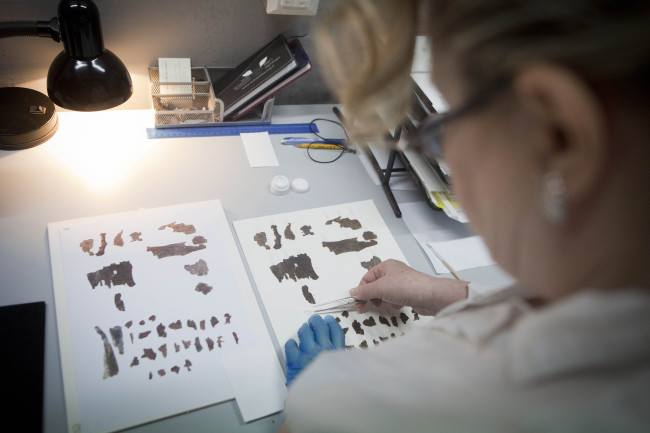JERUSALEM (AP) ― Parts of the Dead Sea Scrolls are up for sale ― in tiny pieces.
Nearly 70 years after the discovery of the world’s oldest biblical manuscripts, the Palestinian family who originally sold them to scholars and institutions is now quietly marketing the leftovers ― fragments the family says it has kept in a Swiss safe deposit box all these years.
Most of these scraps are barely postage-stamp-sized, and some are blank. But in the last few years, evangelical Christian collectors and institutions in the U.S. have forked out millions of dollars for a chunk of this archaeological treasure. This angers Israel’s government antiquities authority, which holds most of the scrolls,euroclaims that every last scrap should be recognized as Israeli cultural property,euroand threatens to seize any more pieces that hit the market.
Nearly 70 years after the discovery of the world’s oldest biblical manuscripts, the Palestinian family who originally sold them to scholars and institutions is now quietly marketing the leftovers ― fragments the family says it has kept in a Swiss safe deposit box all these years.
Most of these scraps are barely postage-stamp-sized, and some are blank. But in the last few years, evangelical Christian collectors and institutions in the U.S. have forked out millions of dollars for a chunk of this archaeological treasure. This angers Israel’s government antiquities authority, which holds most of the scrolls,euroclaims that every last scrap should be recognized as Israeli cultural property,euroand threatens to seize any more pieces that hit the market.

“I told Kando many years ago, as far as I’m concerned, he can die with those scrolls,’’ said Amir Ganor, head of the authority’s anti-looting squad, speaking of William Kando, who maintains his family’s Dead Sea Scrolls collection. “The scrolls’ only address is the State of Israel.’’
Kando says his family offered its remaining fragments to the antiquities authority and other Israeli institutions, but they could not afford them.
“If anyone is interested, we are ready to sell,’’ Kando told the Associated Press, sitting in the Jerusalem antiquities shop he inherited from his late father. “These are the most important things in the world.’’
The world of Holy Land antiquities is rife with theft, deception, and geopolitics, and the Dead Sea Scrolls are no exception.
Their discovery in 1947, in caves by the Dead Sea east of Jerusalem, was one of the greatest archaeological events of the 20th century.euroScholarly debate over the scrolls’ meaning continues to stir high-profile controversy, while the Jordanian and Palestinian governments have lodged their own claims of ownership.
But few know of the recent gold rush for fragments ― or Israel’s intelligence-gathering efforts to track their sale.
Written mostly on animal skin parchment about 2,000 years ago, the manuscripts are the earliest copies of the Hebrew Bible ever found, and the oldest written evidence of the roots of Judaism and Christianity in the Holy Land.
They are also significant because they include the Hebrew originals of non-canonical writings that had only survived in ancient translations, and because they prove that multiple versions of Old Testament writings circulated before canonization around A.D. 100. While some of the scrolls are nearly identical to the traditional Hebrew text of the Old Testament, many contain significant variations.
-
Articles by Korea Herald








![[Kim Seong-kon] Democracy and the future of South Korea](http://res.heraldm.com/phpwas/restmb_idxmake.php?idx=644&simg=/content/image/2024/04/16/20240416050802_0.jpg&u=)










![[Today’s K-pop] Zico drops snippet of collaboration with Jennie](http://res.heraldm.com/phpwas/restmb_idxmake.php?idx=642&simg=/content/image/2024/04/18/20240418050702_0.jpg&u=)